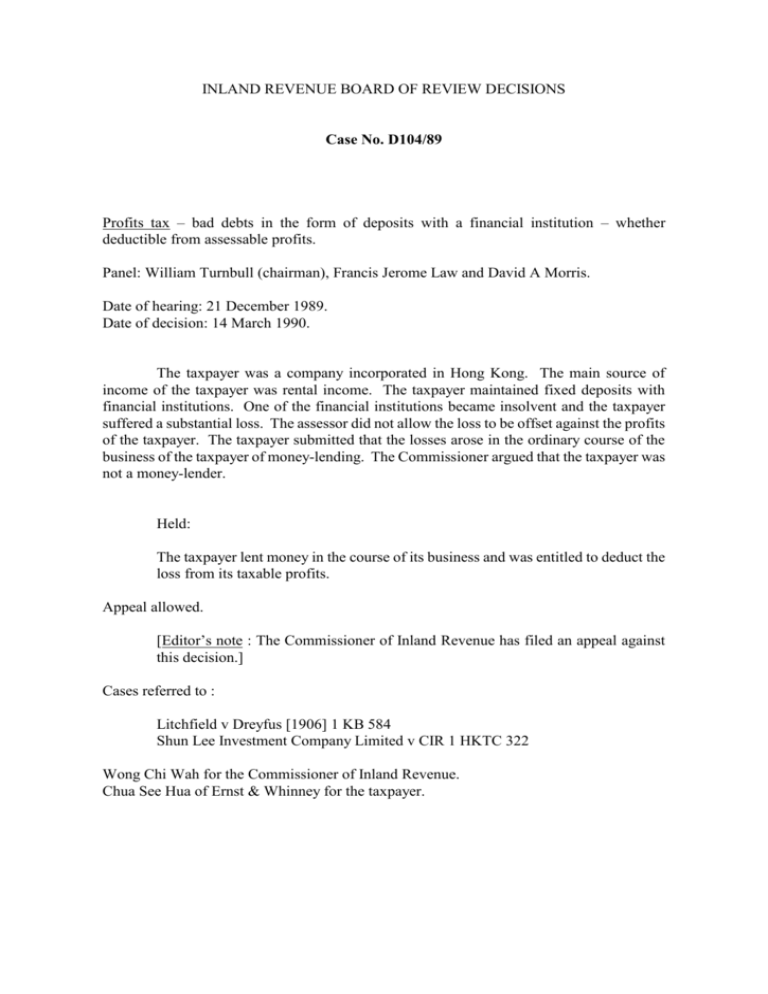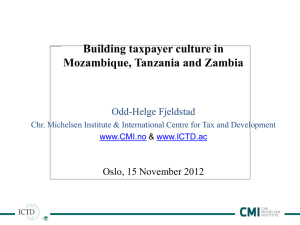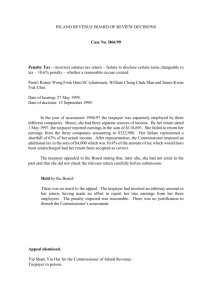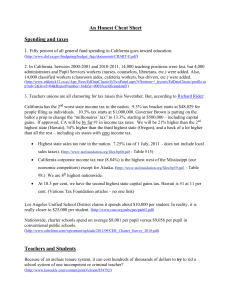Document
advertisement

INLAND REVENUE BOARD OF REVIEW DECISIONS Case No. D104/89 Profits tax – bad debts in the form of deposits with a financial institution – whether deductible from assessable profits. Panel: William Turnbull (chairman), Francis Jerome Law and David A Morris. Date of hearing: 21 December 1989. Date of decision: 14 March 1990. The taxpayer was a company incorporated in Hong Kong. The main source of income of the taxpayer was rental income. The taxpayer maintained fixed deposits with financial institutions. One of the financial institutions became insolvent and the taxpayer suffered a substantial loss. The assessor did not allow the loss to be offset against the profits of the taxpayer. The taxpayer submitted that the losses arose in the ordinary course of the business of the taxpayer of money-lending. The Commissioner argued that the taxpayer was not a money-lender. Held: The taxpayer lent money in the course of its business and was entitled to deduct the loss from its taxable profits. Appeal allowed. [Editor’s note : The Commissioner of Inland Revenue has filed an appeal against this decision.] Cases referred to : Litchfield v Dreyfus [1906] 1 KB 584 Shun Lee Investment Company Limited v CIR 1 HKTC 322 Wong Chi Wah for the Commissioner of Inland Revenue. Chua See Hua of Ernst & Whinney for the taxpayer. INLAND REVENUE BOARD OF REVIEW DECISIONS Decision: This is an appeal by a limited company against the refusal by the Commissioner to allow the company to offset certain irrecoverable loans against its profits assessable to tax. The facts of the appeal are as follows: 1. The Taxpayer was incorporated in Hong Kong in 1973. 2. At all relevant times, the Taxpayer’s main sources of income were rental income from the letting of properties and interest income from fixed deposits. For many years prior to the year of assessment 1985/86 the Taxpayer had placed money on deposit with various financial institutions in Hong Kong which deposits were made, varied, uplifted and rolled over as the Taxpayer from time to time thought fit. Over the years the Taxpayer placed money on deposit with various financial institutions but unfortunately for the Taxpayer most of its deposits were latterly with X Limited, a financial institution which appears to have collapsed in or before the year of assessment 1983/84. 3. In its profit and loss account for the year ended 29 February 1984, the Taxpayer charged against its profit an amount of $12,655,594 described as ‘fixed deposits with [X Limited] written off’. The Taxpayer did not claim this amount as a deduction in its profits tax computation for the year of assessment 1983/84. 4. The Taxpayer submitted a profits tax return for the year of assessment 1985/86 and its accounts for the year ended 28 February 1986. In its proposed profits tax computation, the Taxpayer claimed a deduction of $12,013,916 being fixed deposits with X Limited written off. The amount was computed as follows: Fixed deposits with X Limited written off: $ Balance outstanding 12,655,594 Less: Dividend received from X Limited (in liquidation) 641,678 Total The Taxpayer provided the following note to this claim: $12,013,916 ========= INLAND REVENUE BOARD OF REVIEW DECISIONS ‘ Since 1973, a deposit account has been maintained with [X Limited]. A balance of $12,655,594 was receivable on 18 January 1984, the date of liquidation. The directors considered it prudent to write off provisionally the amount of $12,655,594 as an extraordinary item in the accounts for the year ended 29 February 1984. Being a provision, this amount was not included in their profits tax return for 1983/84. Subsequently, a dividend of $641,678.05 was received. The directors consider that the balance of $12,013,916 should be written off. They assure you that should any dividend be received in future, it will be accounted for in their returns.’ 5. The assessor did not agree that the amount $12,013,916 should be an allowable deduction and assessed the Taxpayer accordingly. 6. By letter dated 20 February 1987, the tax representative for the Taxpayer objected to the assessment issued by the assessor on the ground that it was not in accordance with the return submitted. 7. In correspondence with the assessor, the tax representative provided the following information in respect of the fixed deposits with X Limited: The amount written off is made up of : $ Hong Kong dollars deposits 930,223 US dollars deposits 11,725,371 Total $12,655,594 ========= 8. In his determination dated 10 April 1989, the Commissioner confirmed the assessment of the assessor. 9. By letter dated 4 May 1989, the tax representative for the Taxpayer duly appealed against the Commissioner’s determination. At the hearing of the appeal, the Taxpayer was represented by its tax representative. The representative submitted that the fixed deposits with X Limited were bad debts in the ordinary course of the business of the Taxpayer which was money-lending. She said that it was necessary to prove four elements to satisfy the Board of Review that the moneys written off were tax deductible. She said that the debt must be a bad debt and this was not disputed by the Commissioner. She said that the debt must be in respect of moneys lent and submitted that this was clear from the facts of the case. She submitted that the Taxpayer must have carried on the business of lending money and submitted that on the INLAND REVENUE BOARD OF REVIEW DECISIONS facts of the case, the Taxpayer was carrying on business of lending money. She drew attention to the fact that interest income was a substantial percentage of the income of the Taxpayer. She then said that the fourth element was to demonstrate that the money was lent in the ordinary course of the Taxpayer’s business. She said that the money lost was not the loss of a capital asset but was part of the circulating capital of the Taxpayer. The representative for the Commissioner submitted that to be tax deductible, bad debts must be debts in respect of money lent in the ordinary course of the business of lending money within Hong Kong by a person who carries on that business. He cited the wording of the first proviso to section 16(1)(d) of the Inland Revenue Ordinance. He went on to address the Board at some length on the meaning of the business of money-lending and drew the attention of the Board to the cases of Litchfield v Dreyfus [1906] 1 KB 584 and Shun Lee Investment Company Limited v CIR 1 HKTC 322. He submitted that a distinction should be drawn between investments made by a company and loans made by a company. He referred to the Australian Income Tax Act and submitted that the Taxpayer in this case did not carry on the business of money-lending because it placed money on deposit with financial institutions and did not offer to lend money to the public at large. He submitted that the activities of the Taxpayer did not constitute carrying on the business of money-lending within the meaning of the first proviso to section 16(1)(d) of the Inland Revenue Ordinance. With due respect to the Commissioner, we are not able to agree with the submissions made before us by his representative. The rules relating to bad debts are set out in section 16(1)(d) of the Inland Revenue Ordinance. The relevant part of which reads as follows: ‘ 16(1)(d) Bad debts incurred in any trade, business or profession, proved to the satisfaction of the assessor to have become bad during the basis period for the year of assessment, and doubtful debts to the extent that they are respectively estimated to the satisfaction of the assessor to have become bad during the said basis period notwithstanding that such bad or doubtful debts were due and payable prior to the commencement of the said basis period: Provided that – (i) deductions under this paragraph shall be limited to debts which were included as a trading receipt in ascertaining the profits, in respect of which the person claiming the deduction is chargeable to tax under this Part, of the period within which they arose, and debts in respect of money lent, in the ordinary course of the business of the lending of money within Hong Kong, by a person who carries on that business; INLAND REVENUE BOARD OF REVIEW DECISIONS (ii) all sums recovered during the said basis period on account of amounts previously allowed in respect of bad or doubtful debts shall for the purposes of this Ordinance be treated as part of the profits of the trade, business or profession for that basis period.’ We do not consider that the reference to carrying on the business of lending money within Hong Kong refers to registered money-lenders only. It is not a pre-requisite to being able to claim a debt as a bad debt that the Taxpayer should be a registered money-lender. In our opinion, it is the clear intention of the Inland Revenue Ordinance to allow the deduction of bad debts where a person has lent money, for example, as in the present case, by placing it on deposit with financial institutions. The word ‘business’ has a very wide meaning and this has often been argued by the Commissioner himself in previous cases. The business of money-lending is not restricted to lending money to the public. A person can carry on a business of money-lending by making funds available to banks and other financial institutions by way of fixed deposits. In this case the Taxpayer earned significant income for itself by placing moneys on deposit with various financial institutions including X Limited. The nature of this business was for the Taxpayer to place money on deposit in various sums, uplift the same, and to roll over some of it for various periods of time. This constitutes carrying on the business of the lending of money. In the present appeal the Taxpayer chose to lend its money to a financial institution which became insolvent and as a result the Taxpayer lost a substantial sum of money. The loss suffered by the Taxpayer is deductible against its profits in the same way as any other loss incurred in the course of carrying on business. We reject a submission made on behalf of the Commissioner that the Taxpayer ‘invested’ its money in fixed deposits rather than lending its money. A person who places money on deposit with a financial institution lends money to that institution. If a person was buying and selling or buying and retaining certificates of deposit the position might be different but that is not what we have in this case. On the facts before us it is clear that what the Taxpayer did was to lend money as a business and not to invest capital. For the reasons given, we allow this appeal and direct that the assessment appealed against be remitted back to the Commissioner so that he may make the necessary amendments thereto by allowing the losses claimed by the Taxpayer in full.







